The age-old struggle for transparent and participatory governance is finding a new champion in "decentralization on demand." Leveraging blockchain technology, this innovative model empowers local communities to reclaim control, making decisions that directly impact their lives with unprecedented transparency and accountability.
Table of Contents
The Challenges of Traditional Local Governance
Traditional local governance, often centralized in structure, faces significant challenges marked by inefficiencies, opacity, and a disconnect between decision-makers and the communities they serve. These systemic flaws impede progress, hinder innovation, and undermine public confidence.
Bureaucracy and Inefficiency: The Burden of Centralized Decision-Making
Centralized governance is synonymous with bureaucratic complexity and slow decision-making processes. Multiple layers of approval, intricate procedures, and fragmented communication channels contribute to substantial delays in implementing crucial projects and policies. This inefficiency not only obstructs development but also results in resource wastage and missed opportunities.
Furthermore, centralized systems often lack the flexibility to promptly address the evolving needs and priorities of local communities. Decisions made centrally may overlook the nuanced challenges specific to different localities, leading to discontent and disengagement among residents.
Lack of Transparency: Concealing Government Actions
Transparency is fundamental to effective governance, yet centralized structures frequently lack the mechanisms necessary for public scrutiny of governmental actions and decisions. This lack of transparency fosters an environment susceptible to corruption, where decisions made discreetly can be swayed by vested interests or personal agendas.
Moreover, the absence of transparent processes makes it challenging for citizens to comprehend the allocation of public funds and the rationale behind decisions impacting their lives directly. This opacity breeds skepticism and diminishes trust in governmental institutions.
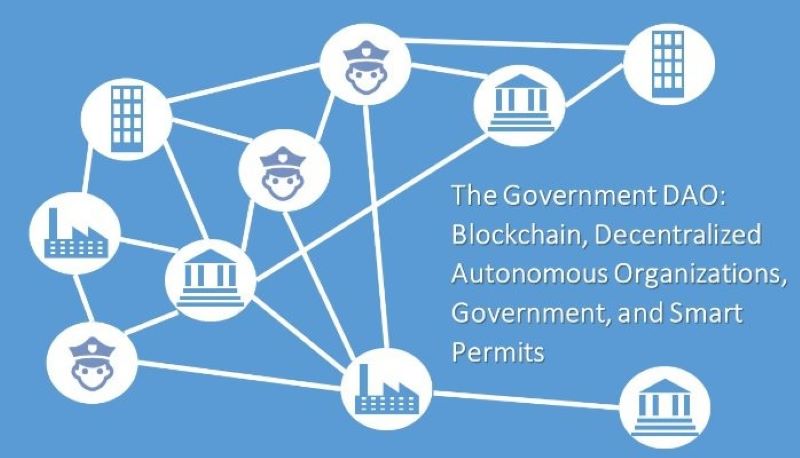
Limited Citizen Participation: Unheard Voices
In traditional local governance models, citizen engagement often revolves around electoral participation alone. However, genuine participation extends beyond voting; it encompasses active involvement in decision-making processes, providing feedback, and ensuring accountability of elected officials.
Centralized systems frequently fail to cultivate meaningful avenues for citizen engagement. This deficiency results in policies and projects that fail to align with community needs and aspirations, further eroding public trust and diminishing civic involvement.
How Decentralization on Demand Can Transform Local Governance
Decentralization on demand, driven by blockchain technology, presents a revolutionary approach to addressing the limitations of conventional local governance. This innovative paradigm redistributes power and decision-making authority, promising to significantly enhance community engagement, transparency, and accountability.
Empowering Communities: A Voice for the People
Central to decentralization on demand is the empowerment of communities by reinstating decision-making authority in their hands. This empowerment enables communities to take charge of their governance, making crucial decisions on matters directly impacting their daily lives, such as local development initiatives, resource allocation, and public service provisions.
Through decentralized platforms and voting mechanisms, citizens actively participate in shaping their communities. This not only cultivates a sense of ownership and responsibility but also ensures that decisions align closely with the genuine needs and aspirations of those affected. By amplifying community voices, decentralization on demand fosters fairer and more responsive governance.
Increasing Transparency: Illuminating Government Actions
Transparency forms the bedrock of trust within any governance framework. Decentralization on demand utilizes blockchain technology to establish immutable and transparent records of governmental actions, decisions, and financial transactions. This transparent ledger of events promotes accountability, as every action is documented and subject to public scrutiny.
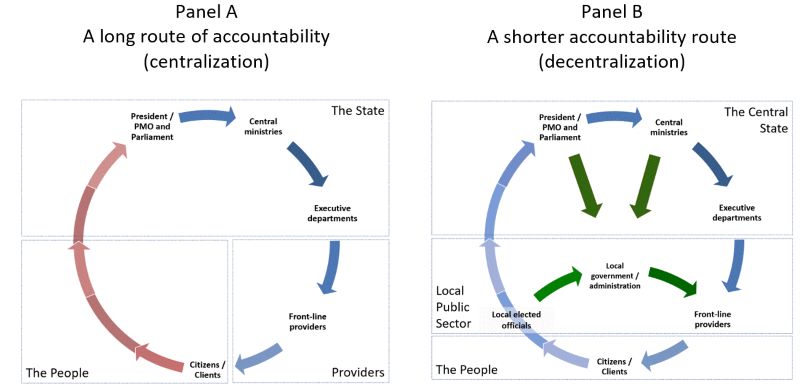
With blockchain, citizens gain effortless access to monitoring the utilization of public funds, verifying the authenticity of governmental documents, and tracking project progress. Such transparency not only fortifies trust between the government and its populace but also acts as a deterrent against corruption while promoting responsible governance.
Enabling Citizen Participation: Beyond Electoral Processes
In contrast to traditional local governance models where citizen participation often revolves around periodic elections, decentralization on demand transcends the confines of the electoral cycle. It empowers citizens to actively engage in the decision-making continuum.
Blockchain-based platforms facilitate direct citizen participation through diverse mechanisms, including:
- Voting on proposals: Enabling citizens to vote on proposals submitted by community members or governmental entities, ensuring decisions reflect collective consensus.
- Providing feedback: Allowing citizens to offer feedback on governmental policies and services, fostering ongoing enhancements and responsiveness.
- Initiating proposals: Empowering citizens to propose new projects or initiatives, thereby catalyzing innovation and community-driven development.
This multifaceted approach not only democratizes decision-making but also strengthens community cohesion and governance efficacy.
Real-World Applications of Decentralization on Demand
Decentralization on demand isn't just a theoretical concept—it's actively transforming various aspects of local governance, demonstrating tangible benefits for communities.
Participatory Budgeting: Empowering Community Allocation of Public Funds
Participatory budgeting (PB) empowers community members to directly decide how a portion of public funds should be allocated. Traditionally, PB has faced challenges in ensuring transparency and efficiency in vote gathering and tallying.
Blockchain-based platforms revolutionize PB by offering a secure, transparent, and efficient method for collecting and verifying votes. Citizens can securely cast their votes using digital identities, and blockchain's immutable nature ensures votes remain tamper-proof. Real-time tracking of fund allocation and expenditures enhances accountability, reducing the risks associated with corruption.
Decentralized Urban Planning: Community-Driven Development
Urban planning decisions profoundly impact residents' lives. Decentralized urban planning platforms enable communities to actively participate in shaping their neighborhoods.
These platforms facilitate transparent discussions, surveys, and voting on proposed developments, ensuring residents' voices are recorded immutably. Blockchain technology guarantees transparency, fostering trust that community input directly influences decisions.
.jpg)
Other Applications: Diverse Possibilities
The applications of decentralization on demand extend across various local governance domains:
- Waste Management: Blockchain platforms can track and manage waste collection and disposal, ensuring transparency and accountability.
- Public Safety: Decentralized platforms allow residents to report and address public safety concerns, empowering community involvement in local safety initiatives.
- Environmental Protection: Blockchain can monitor environmental data, track pollution levels, and incentivize eco-friendly practices, promoting sustainable development at the local level
Challenges and Considerations for Implementing Decentralization on Demand
Decentralization on demand offers a promising path toward more transparent and participatory local governance. However, its successful implementation faces multifaceted challenges that require careful consideration and proactive measures.
Technical Challenges: Building Robust and Scalable Infrastructure
The integration of blockchain technology into local governance encounters technical hurdles that must be addressed:
- Scalability: Blockchain networks may struggle with processing large volumes of transactions efficiently, leading to delays and increased costs. Solutions such as sharding and enhanced consensus mechanisms are essential for scalability.
- Interoperability: Integrating blockchain systems with existing infrastructure is complex due to varying protocols. Developing standardized protocols is crucial for seamless integration.
- Security: While blockchain offers enhanced security features, vulnerabilities like smart contract bugs require stringent security measures, including regular audits and vulnerability assessments.
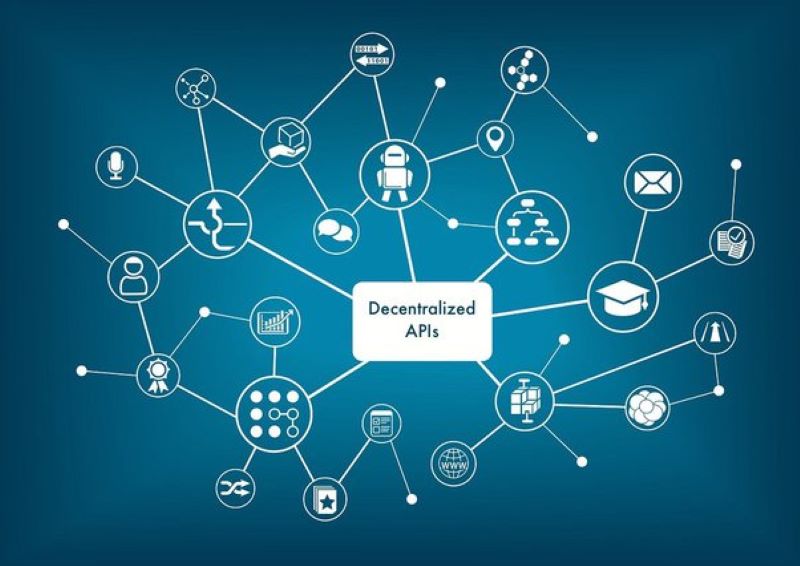
Governance Challenges: Establishing Clear Frameworks and Processes
Implementing decentralized governance models requires well-defined frameworks and transparent decision-making processes:
- Decision-making mechanisms: Determining how decisions will be made within a decentralized system, such as through voting or consensus, with clear quorum requirements and voting thresholds.
- Dispute resolution: Establishing mechanisms for resolving disputes among stakeholders, possibly through mediation or arbitration.
- Community engagement: Encouraging citizen participation in decision-making through effective feedback mechanisms and engagement strategies.
Public Acceptance: Educating and Building Trust
Overcoming public skepticism toward blockchain technology in governance requires focused efforts:
- Public education: Governments must educate the public about the benefits of blockchain and decentralized governance.
- Stakeholder involvement: Involving stakeholders in the design and implementation processes to address concerns and ensure solutions meet community needs.
Decentralization on demand is a transformative approach to local governance, addressing inherent shortcomings of traditional centralized systems. By empowering communities, promoting transparency through blockchain technology, and enabling direct citizen participation, this innovative model has the potential to revolutionize local government operations.
While technical, managerial, and public acceptance challenges persist, the promise of a more efficient, accountable, and responsive local governance system is within reach. As blockchain technology continues to evolve and decentralized governance models gain prominence, we can expect to see increasing real-world applications demonstrating the power of decentralization on demand.
A prime example of successful implementation of this model is U2U Network. With its unique subnet architecture, U2U enables the creation of customizable sub-blockchains to meet specific project and community needs. This opens doors to flexible and effective local governance applications, from participatory budgeting to decentralized urban planning.
Ultimately, the success of decentralization on demand depends on the willingness of governments and communities to embrace this new model and collaborate to create a fairer and more participatory future for local governance, as pioneered by U2U Network.


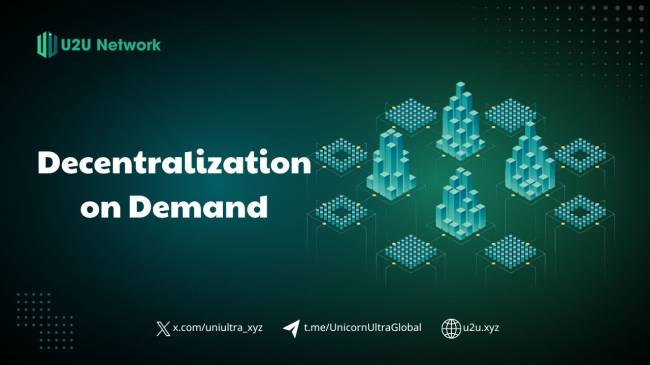
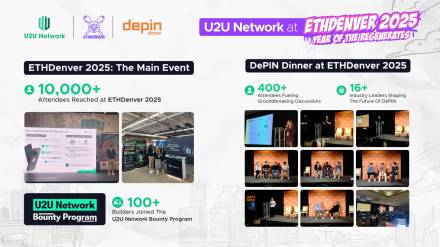

.png)
